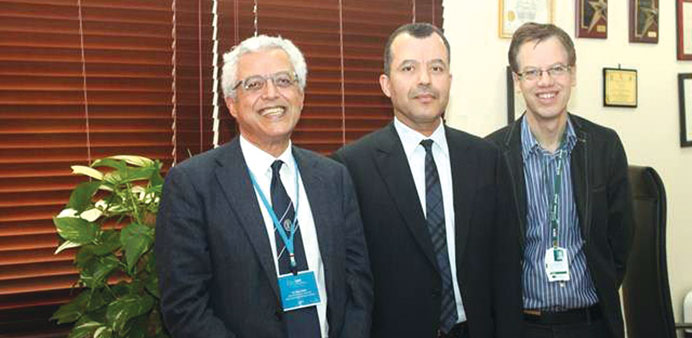By Joseph Varghese/Staff Reporter
In a major breakthrough, a Qatar Biomedical Research Institute (QBRI) team has developed a new line of treatment for diabetes using stem cells.
The world’s first clinical trial for diabetes using stem cells will begin at the Hamad General Hospital later this year.
QBRI researchers have claimed that the findings would realise the dream of providing personalised medical care to diabetics in the country.
In an exclusive interview with Gulf Times, QBRI executive director Dr Abdelali Haoudi said the first clinical trial for diabetes using stem cells would begin at Hamad Hospital “most probably in six months from now”.
QBRI Genomic Medicine and Systems Biology Research Centre scientific director Dr Philippe Froguel and Stem Cell and Regenerative Medicine Research Centre scientific director Dr Nagy Habib were also present at the interview.
Dr Haoudi said that research was going on in full swing at the clinical laboratories in Weill Cornell Medical College in Qatar (WCMC-Q) and Qatar Science and Technology Park (QSTP). “This will be the first-of-its-kind approach in the world in the treatment for diabetes,” he said.
“It will be followed by stem cell treatment for many other diseases such as cancer. QBRI will be the catalyst for people from other parts of the world to come to Qatar for treatment of rare diseases at Hamad hospital and the upcoming Sidra Medical and Research Centre.”
QBRI scientists Dr Nagy Habib and Dr Philippe Froguel, engaged in genomic medicine and stem cell research, observed that the top priority for research in Qatar was diabetes, followed by cancer.
Dr Habib said: “We have set up a clinical trial protocol in collaboration with Imperial College London and have met with the Supreme Council of Health officials for ethics for approval of clinical trial in Doha.”
Referring to patients using insulin for diabetes, he added: “These are still early days of testing. By using stem cells, the patient would not need insulin injections any more. The stem cells for treatment can be taken from the blood of the patient or it can be collected from any other external source.”
Dr Froguel said that his studies were focused on genetic testing of young people who are obese and diabetics in Qatar. “If we can make the genetic testing successful we can cure people from diabetes. We have developed a methodology of easy screening of genes which is not expensive. Done in collaboration with colleagues in Qatar, it is something that we will implement within the next three months.”
Dr Habib hoped that within two years, diabetics could avail of stem cell treatment in Qatari hospitals. “Once they get a dose of stem cells, they need not take any medicines. At the moment these cells will only last for six months and we are trying to make them last longer for a year or more. Stem cells are very intelligent and are the best option for treating diabetes.”
He suggested that the same method could be applied for other diseases as well. “What we are doing at present is in the area of diabetes. We are also trying to make it work in many other critical diseases.
“Stem cells can be ‘deposited’ in the body to meet various needs in different parts of the body,” he added.

Dr Abdelali Haoudi, centre, with Dr Habib and Dr Froguel.
